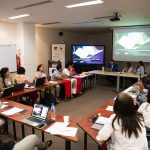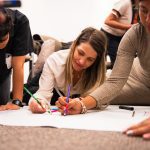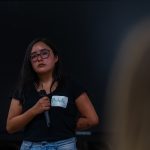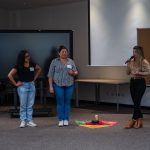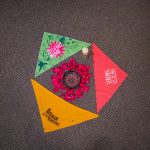Gender-Based Violence and the Mental Health of Women Human Rights Defenders: Recognizing the Impact and Proposing Prevention, Care, and Reparation Measures
Washington, DC; November 25, 2024.– Berta Soler, leader of the organization Damas de Blanco (Cuba), began her activism when her son was four years old; today, he is 29. During that time, Soler was the target of different forms of repression by the Cuban government, due to her persistent struggle for people deprived of liberty for political reasons on the island.
“Sometimes children are neglected, and other roles are assumed, and that is shocking,” Soler shares, alluding to the double and even triple role assumed by women activists and human rights defenders in societies where sexist violence prevails and, in addition, in societies with authoritarian governments that are opposed to the actions of independent civil society.
In the last three months alone, the Cuban activist has been arbitrarily detained and subjected to forced disappearance on two occasions. The first occurred on September 22, when State Security agents arrested her and took her to a police station, where she remained for 67 hours; and the second time was on November 10, when she was missing for more than 76 hours.
“Here (in Damas de Blanco) we have women who have stood at the door of their homes selling thermoses of coffee, and the only thing they get out of it is a miniscule payment, and the Cuban regime arrives and tells you ‘You can’t sell that, because if you do, I’ll put you in jail’. Because you are a human rights defender, your life is already marked, your life is marked. They exclude you from society,” she explains.
Recognizing a Nuanced Problem
To commemorate the International Day for the Elimination of Violence against Women, the Institute on Race, Equality and Human Rights (Race and Equality) proposes raising the visibility of the testimonies of women activists who, by promoting and defending human rights, are exposed to multiple forms of violence that impact on their mental health, and we are making a series of recommendations to put an end to this scourge.
The United Nations has recognized that women working for women’s rights and gender equality are frequently the targets of gender-based violence, discrimination, and threats because their work challenges traditional gender norms and exposes structural inequalities in society, and because they face the usual risks of defenders – considered to be one of the most dangerous activities in Latin America – they suffer specific attacks due to their identity, membership in feminist movements, or the focus of their work, such as the promotion of the rights of LGBTI+ people.
For Maria Eduarda Aguiar, a trans woman, lawyer, and volunteer, with the Grupo Pela Vidda in Rio de Janeiro, and president of the LGBT State Council for 2022-2024, the violence faced by women in the political sphere in Brazil is marked by the murder of Marielle Franco, a human rights defender, and Rio de Janeiro councilor who was brutally murdered in March 2018.
“In this way, women’s mental health is extremely affected by the countless forms of violence to which we are exposed to for defending an idea, occupying a space, or raising a banner. But we must continue fighting for inclusive, anti-racist, anti-LGBTIphobic, and feminist education,” she says.
The violence faced by women activists is compounded by stigma and a lack of effective protection mechanisms, which impacts their mental health and manifests itself with high levels of stress, anxiety, depression, and in many cases, post-traumatic stress disorder. These consequences are linked not only to the physical and psychological aggressions they face but also to social isolation, emotional exhaustion, and the overload of responsibilities in hostile contexts.
Such is the case of Berta Soler and other members of the organization Damas de Blanco, in Cuba, whose case recently led to a joint communication to the Government of Cuba by eight United Nations Rapporteurs and specialists, including the Office of the Special Rapporteur on the situation of human rights defenders, the Office of the Special Rapporteur on violence against women and girls, its causes and consequences, the Office of the Special Rapporteur on contemporary forms of racism, racial discrimination, xenophobia and related intolerance, and the Office of the Special Rapporteur on the rights to freedom of peaceful assembly and of association.
In this communique, they express their concern over the situation of arbitrary detentions, criminalization, violence, harassment, surveillance, and threats against Berta Soler and members of the organization Damas de Blanco, and request that the Government respond to the alleged facts within sixty days.
Azahalea Solís, a Nicaraguan human rights defender, highlights the fact that violence against women also affects the people around them and that fear, as one of the consequences, translates into a lack of fullness of life, participation, action, and self-expression. “The civic life of women who suffer violence is also affected and, therefore, their political participation, as well as their economic autonomy, and their social relationships,” she stresses.
From Peru, Jimena Holguín, a member of Lesbianas Independientes Feministas Socialistas (LIFS), delves into the effects that gender-based violence can have on women’s lives.
“We can experience stress; that is, a state of tension, alertness; insecurity, fear to the point of terror or panic. It can cause anxiety, depression, low self-esteem, isolation, sleep and eating disorders […]. Depression can become very severe, losing sense of life and even of being, to such an extreme that, wanting to escape from their reality of abuse, oppression and violence, they may commit suicide,” she highlights.
María Camila Zúñiga Saa, a member of the Movimiento de Mujeres Unidas, Diversas y Empoderadas (MUDE), brings up that women’s lives are marked by the violence they suffer in the private sphere, especially from their partners. In this regard, she points out: “One of the first manifestations of the aggressor is to attack you psychologically, make you feel ugly, weak, incapable, among other things. All with the intention of having control over you and making you dependent so they may abuse you to their liking and need.”
To this, she adds that, in the public sphere, such violence can be aggravated because “society reproduces patterns and stereotypes, and in fact, they come to blame you for many of the situations you experience as a victim. In addition, the negligence of institutions increases mental health crises by feeling alone and unprotected.”
The Inter-American Commission on Human Rights, in the document Practical Guide on Guidelines and Recommendations for the Preparation of Risk Mitigation Plans for Human Rights Defenders, states that the impact of violence is aggravated when women activists belong to vulnerable groups. “For example, Afro-descendant, Indigenous, or LGBTQ+ women face intersectional forms of discrimination that add additional layers of violence and exclusion,” it says.
Recommendations for a Comprehensive Response
Gender-based violence not only seeks to silence women activists but also has a profound and lasting impact on their mental and emotional health. By recognizing the magnitude of this problem, we can move toward a comprehensive support system that not only allows them to heal but also to continue their invaluable work for justice and human rights.
For Nedelka Lacayo, of Enlace de Mujeres Negras de Honduras (ENMUEH), it is essential that States design and implement prevention, care, and reparation programs. Furthermore, she points out that access to justice is a key element in this process, since the high rates of impunity generate mistrust in women who suffer violence and inhibit them from deciding to turn to the authorities.
It is the responsibility of States under international human rights standards, such as the Convention on the Elimination of All Forms of Discrimination against Women (CEDAW) and the Convention of Belém do Pará to guarantee the protection of women’s human rights defenders and eradicate all forms of violence that affect them.
Therefore, Race and Equality, makes the following recommendations:
- To States:
- Adoption and implementation of a legal framework against gender-based violence: Adopt and implement laws that address all forms of violence against women, with effective monitoring and enforcement mechanisms. These laws should ensure the comprehensive protection of women, especially women human rights defenders, and address intersectional violence.
- Strengthening protection systems for women defenders: Create specific mechanisms to protect women defenders, designed in consultation with them, to prevent aggression, criminalization, and stigmatization for their work.
- Creation of effective response systems: Establish specialized units in the security forces and the justice system to address gender-based violence, guaranteeing exhaustive, impartial investigations and sanctions for those responsible.
- Eradication of restrictions on fundamental rights: Ensure the full exercise of freedom of expression, assembly, and association, eliminating any measure that limits women or their organizations in their work to defend human rights.
- Public policies and dialogue with civil society: Allocate sufficient resources to implement programs for the prevention and care of gender-based violence and guarantee the participation of women’s organizations in their design, execution, and evaluation.
- To international organizations:
- Consolidation of monitoring and reporting mechanisms: Establish or strengthen independent monitoring and documentation systems on the situation of women human rights defenders and gender-based violence in countries, ensuring that findings are used to pressure States to comply with their international obligations.
- Technical assistance and training: Provide technical assistance and training programs for civil society organizations and States on international standards on human rights, gender-based violence, and protection of women human rights defenders, promoting local capacity building.
- Political and diplomatic advocacy: Use their influence in international forums and diplomatic relations to demand that States implement effective measures to eradicate gender-based violence, protect women human rights defenders, and guarantee respect for fundamental freedoms.
- Funding and sustained support to women defenders and local organizations: Provide financial resources to women-led organizations in highly vulnerable contexts, ensuring that they can continue their work with independence and resilience in the face of threats.
- To civil society:
- Strengthen internal and external support networks: Organizations should create safe and confidential spaces where activists can share experiences and seek support without fear of reprisals. Promoting collaborative networking between activists and allies can help foster collective resilience and combat isolation.
- Build capacities in gender-responsive mental health: Train allied mental health professionals to understand the dynamics of gender-based violence and the specific challenges of women human rights defenders. This includes facilitating access to specialized therapies that address both the immediate effects and prolonged impacts of trauma.
- Influence inclusive and protective public policies: Promote dialogues with government institutions to promote the adoption of specific protection protocols for women activists.
- Implement community awareness campaigns: Design and execute campaigns that highlight the fundamental role of women human rights defenders and the risks they face.
In view of the different levels of violence that human rights defenders can face in their day-to-day lives, both physically and emotionally, Race and Equality developed the Guide to Self-Care “If I take care of myself, I can take care of others”, whose objective is for people to become aware of the risks to which they are exposed – especially for their mental health – and to take self-care actions.

